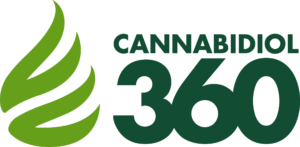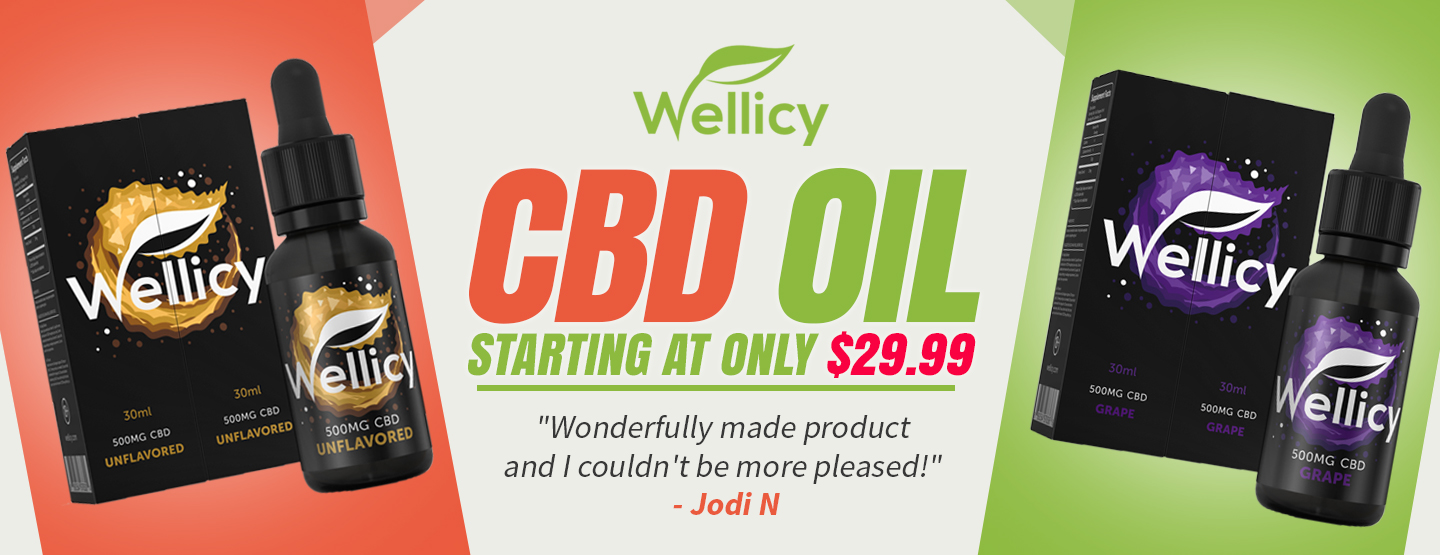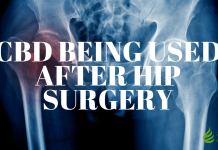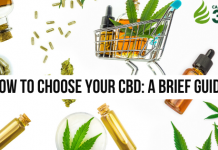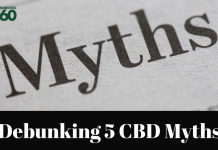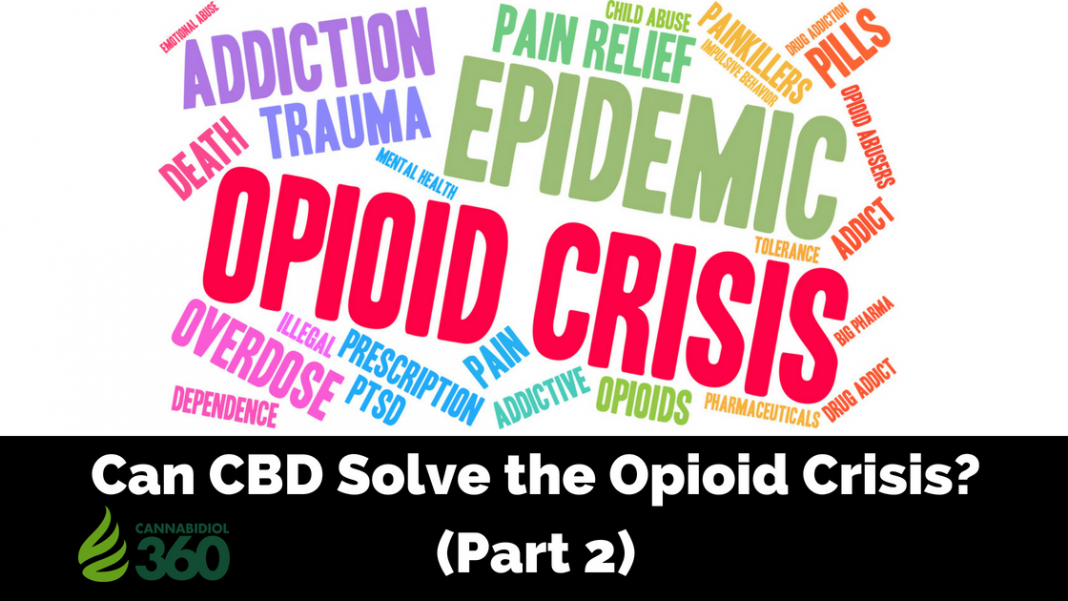
This 2 part article is a personal account of past opioid dependence by Tony Ottomanelli II.
Taking all that was discussed in PART ONE of this 2 part article series, I can’t help but acknowledge the fact that CBD is indeed a miracle in and of itself, for so many reasons.
The first being that it is an extracted organic molecule that affects each person differently as the strain of the plant which the cannabidiol is extracted from, plays a large role on the effects it has in the final product.
However, let us remain mindful that even though there are different effects that occur for each separate person, remember that CBD is also non-psychoactive, meaning no intoxicating outcome.
Taking this into account, there are many people who claim that CBD could cure the Opioid Crisis, among these people are researchers, experts, and other cannabis professionals.
Hopefully, they are all correct, at the same time, how can a non-psychoactive compound essentially defeat one of the most addictive psychoactive compounds known to humankind?
On the flipside, we know that CBD affects everyone differently, so I could possibly see how it might work, but logic and science might prove otherwise.
Recent Research
From all the theories I’ve heard thus far, I believe they are not necessarily accurate but not entirely dismissible either — though all the theories on Fighting the Opiate Epidemic with CBD are typically motivated by wishful thinking.
However, more and more scientific research being done day after day may indeed prove otherwise.
For instance, countless websites and publications claim that recent research shows there is a 25% decrease of opioid-induced deaths in states where marijuana is legalized for medical and recreational use.
At the same time, this data also seems to appear in “recent research” every four years since 2002.
Unfortunately, while I’d love to believe this data is valid, it seems odd there is not much of a change in the percentage every 4 years for nearly two decades— 25% is equivalent to 1/4th.
Which would mean one quarter less opioid deaths in each legalized state and every year the number of states that legalize also rises.
So, why is there no change in the 25% figure of data?
Perhaps, because 25% is such a convenient number to just throw out to curious browsers surfing the Internet?
Hopefully not, but what is the deal?
Not to mention, the national rate at which Americans die from opiates continues to rise higher and higher each year, there has been no decrease nationally.
Then again, in 2018, “recent research” suggests a 25% decrease in legalized cannabis states — when there are now nearly 30 states with either medical or recreational marijuana available?
That can’t be mathematically accurate?
Basically, if there are 25% decreases in opiate deaths in 30 legalized marijuana states, then the national rate of people dying from the opiate substance should be decreasing, but it has only risen higher.
All that seems to be truthful about this statistic is a great deal of uncertainty.
For a visual representation of this see the image below from the National Institute on Drug Abuse in order to visually experience the quantitative statistics that only seem to rise higher each and every year.
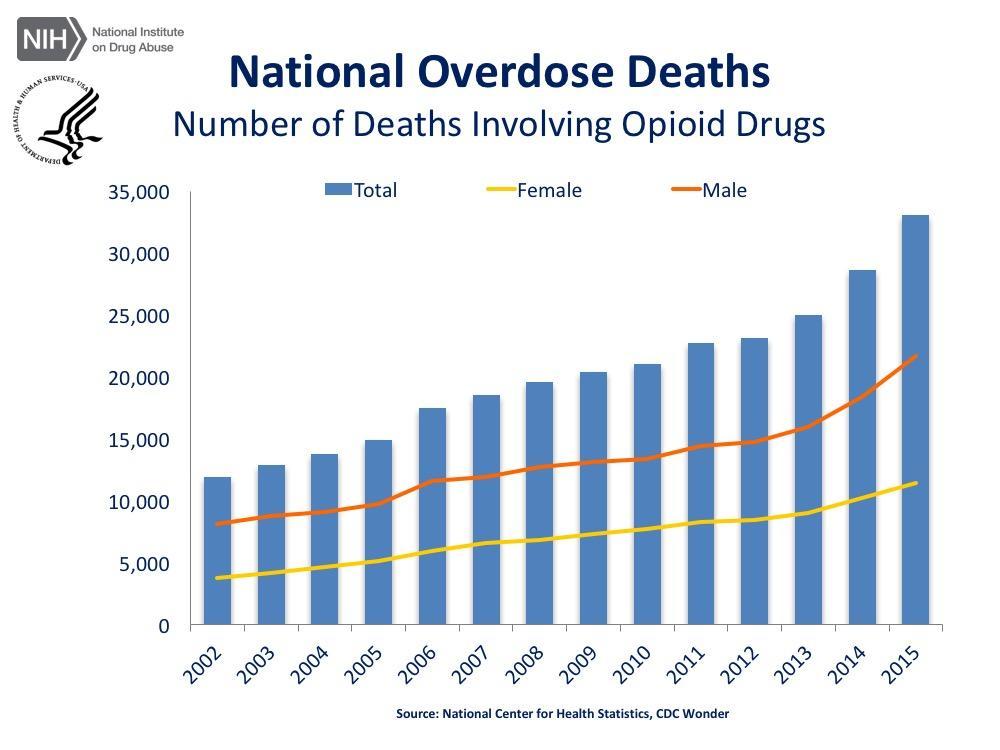
As you can see, if nearly 30 states truly had a 25% decrease in opiate related deaths, then perhaps there should be some type of drop in the amount of deaths each year — maybe a diminishing rising annual bar that appears to never subside?
Perhaps.
One thing is certain, it is difficult to find the solid concrete truth about what is honestly happening with the potential of marijuana or hemp-based CBD to treat opiate addiction.
Regardless, I must reiterate how much I honestly want these pro-cannabis, pro-hemp and pro-CBD stats to all be valid, but you will find that if you dig a little deeper, rather than internalizing the first statistics you come across, you will find the same level of contradiction.
More Recent Research
In addition, back in 2017, a fantastic website I actively read quite often, mindfulfinds.com shares an article titled, Breakthrough: CBD Oil Helps Fight Opioid Addiction.
As we have learned, this title is reflective of a statement that has been claimed countless times.
From this, the title is quite bold, since there is no proof that someone suffering from opiate addiction could find the relief they need in cannabidiol.
The article starts out by stating, “We now have scientific evidence that cannabidiol (CBD) could be an effective replacement for opioid addiction, as well as useful in treating pain. CBD blocks the reward of opioids, and may be used in treating those addicted to them by blocking their rewarding effects, according to a new medical study.”
This article is clearly stating exactly what I have been arguing as my main point all along.
CBD can block the rewarding effects? That’s great and slightly helpful.
Although, blocking the rewards of opiates is not a new discovery. This is already a specific effect generated by a couple of prescription medications, like buprenorphine and naloxone, more commonly referred to as Suboxone.
Plus, a substance used to save the lives of those who are in the process of experiencing an opioid overdose by blocking the rewarding effects — in fact reversing those effects, is called Narcan and now being routinely carried by police officers and EMTs.
My point is that this new found “breakthrough” would do nothing for people currently struggling with addiction to opiates.
The only way to help someone who is addicted to opiates is to discover a way to block the effects of withdrawal symptoms.
Now, actually blocking the “living hell” of withdrawal effects would legitimately be a monumental breakthrough. This would be the number one and only cure for opioid addiction.
The reason why being addicted to opiates is such an impossible trap to escape is not from character flaws like a lack of willpower or disappearance of mental strength or damaged discipline — it is due to the horrendous experience of withdrawal symptoms.
Once a research study is able to determine that they have synthesized the CBD compound in such a way that it can eliminate withdrawal symptoms, then that is the only time anyone can claim to have found an answer to the opioid epidemic.
The article on mindfulfinds closes out by claiming, “Early research has shown that CBD has shown remarkable potential to reduce drug-seeking behavior, diminish withdrawal symptoms, and limit cravings.”
While I wish this were a 110% factual statement, from my own personal agony dealing with pain management and withdrawal symptoms, I can’t begin to believe it.
Overall, I would still highly recommend this website as a quality reference, the specifically highlighted article is the only content I have ever felt the need to be critical about.
CBD Consumer Testimonials
On any CBD brand’s website, you can usually become witness to countless product reviews and user testimonials, in which they are typically, legitimate personal accounts of a customer’s overall experience with that particular CBD product.
These organically generated true life stories of how a specific cannabidiol-based product was ultimately life changing — in the sense that the CBD noticeably treats their particular condition better than any other therapies tried in the past.
Stories of how beneficially advantageous CBD products are for so many different people with mild to severe medical conditions continue to appear everywhere on the web on a daily basis.
Some of these stories are even published in print magazines or newspapers.
One story in particular, includes the first hand testimonials from some UFC fighters.
As a matter of fact, UFC Hall of Fame athlete and certified badass, Bas Rutten has been seen in multiple Hemp and Cannabis publications, claiming that his addiction to opiate-based painkillers was cured with the use of a particular brand of CBD — Receptra.
Now, before I continue, I must remind readers that I am absolutely a hardcore CBD-user, CBD advocate, CBD Reviewer, CBD Researcher & Writer as well as a huge proponent for advocacy in support of the hemp and marijuana plants.
Additionally, I would never accuse anyone’s CBD testimonial of being a dishonest exaggeration, about their personal experience and if it is 110% the truth with no lies attached, then much respect to your swift resolution.
At the same time, this particular scenario where former UFC fighter Bas Rutten claims quitting his addiction to painkillers via Receptra Naturals CBD, is rather hard to fathom.
It’s worth mentioning that Rutten is also the brand ambassador of this particular CBD business, so when someone is receiving compensation for promoting a particular product, a red flag tends to go up.
Once again that is not to say, everything claimed in the story is false.
However, when you are paid to tell stories of a product’s effectiveness, I would imagine some can’t help it, but feel it is necessary to question the validity to these claims.
Personal CBD Testimonial
From being such an avid CBD consumer, I have been determined to discover all the benefits it could possibly offer me, I’ve personally tested out every single form of CBD and every single way to administer the compound.
From fruity or unflavored CBD edibles, concentrated drinks, full-spectrum tinctures, vape juices, capsules, topical ointments in gel or cream form and even the dissolvable products that resemble Listerine breath strips.
There are truly so many options.
Nowadays, the cannabidiol compound is being used as an additive to shampoos and soaps.
Ultimately, CBD has been a major economic disruptor and for good reason — it seems to work for numerous individuals.
So, we are seeing CBD infiltrate so many established marketplaces — from the health and beauty industry to the wellness industry, vape industry, food and beverage industry with origins in the industrial hemp and medical and recreational marijuana industries.
Cannabidiol (CBD) has become nearly ubiquitous throughout the economic landscape — primarily due to its natural healing capabilities and high success rate of effectiveness in improving overall wellness.
With all of my personal experiences taken into consideration, unfortunately I am still searching for the product that delivers relief from experiencing painful circumstances that have only evolved from being diagnosed with spondylolisthesis.
Therefore, any quality CBD brands currently on the market who believe their products can have a positive effect on improving the pain from my spinal condition, I urge you to allow me to consume and review your product.
Overall, I would hope some brands take this as a challenge — I certainly am. It is worth noting that I currently reside in Denver, Colorado.
Taking a Closer Look Into the Crisis
The level at which the opioid crisis has reached is frankly “unfathomable” — who could have predicted such a thing would be a plague on this nation?
The blatant disregard for public health, social behavior and personal responsibility is staggering. The downright disrespect this substance has on so many lives is despicable.
Opiates are the primary focus in this article, however, illicit drugs and prescription narcotics in general are wreaking havoc on American lives.
According to the CDC’s analysis, based on 2015-2016 data from 31 states and Washington, D.C., showed:
- Overall drug overdose death rates increased by 21.5 percent.
- The overdose death rate from synthetic opioids (other than methadone) more than doubled, likely driven by illicitly manufactured fentanyl (IMF).
- The prescription opioid-related overdose death rate increased by 10.6 percent.
- The heroin-related overdose death rate increased by 19.5 percent.
- The cocaine-related overdose death rate increased by 52.4 percent.
- The psychostimulant-related overdose death rate increased by 33.3 percent.
Clearly there is massive drug problem occurring in the United States.
How does this continue to rise and rise with no decrease in death rates at all, even with all the donations, research, programs, charities, treatment centers, legislation and increased public awareness — still, nothing changes.
From this, still opioids remain the most deadly of all substances. For the purpose of providing a visual representation of this particular devastation, see the graphic from CDC.gov included below.
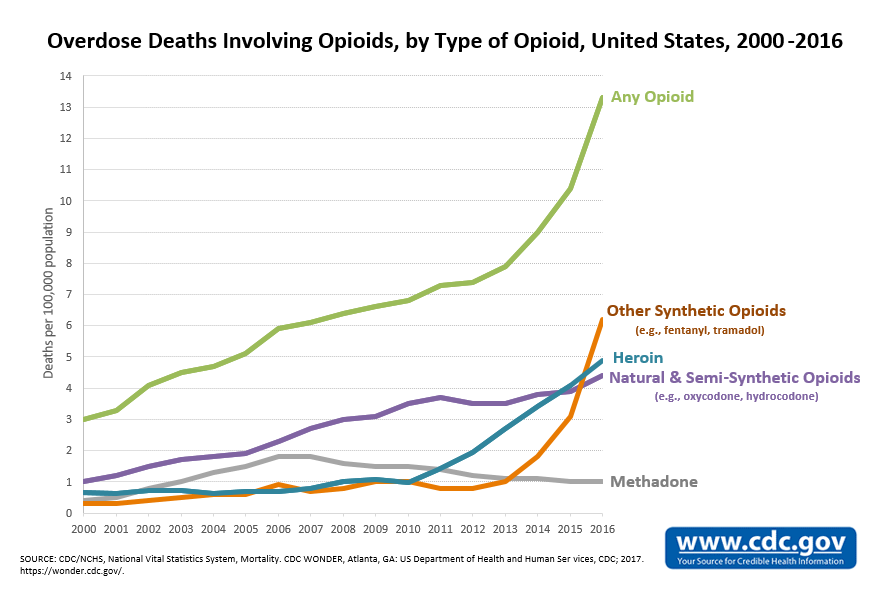
While it seems unlikely that a non-psychoactive compound like cannabidiol can have any chance of combating a powerful psychoactive substance like an opioid, the one hope I believe cannabis can play in becoming a major deterrent of opiate addiction is in “prevention.”
By initially treating disorders, illnesses and diseases with cannabis and hemp-based products, especially infused with CBD, before prescribing strong Rx medications could indeed become a strong opponent to the “sociocide” caused by opiate addiction.
It seems the peak that the opioid crisis could reach is ultimately unknowable yet certainly attainable — one of the rare circumstances we achieve the unfathomable.
Who knew that one day accomplishing and reaching the impossible would be something that essentially stooped so low?
Opioids got Americans so high yet simultaneously took us to the lowest depths of self loathing, despair, and social isolation then we could ever personally or collectively imagine.
This is without a doubt beyond a crisis and far exceeds an epidemic type of label.
This situation is so deadly, these media-friendly “buzz words” like crisis or epidemic due no justice for accurately reflecting the endless pain felt by countless families nationwide.
It will be far more appropriate to give this wicked substance a rightful identity descriptive of this incomprehensible manipulation and label it exactly what the circumstances illustrate it should receive — whatever it deserves, a name that is truly precise in its representation of the vile and scandalous atrocity opioid addiction has become.
It is only fair that this is how it should be labeled.
For instance, mass production of opiates followed by over-prescribing is nothing more than embellishing a direct threat.
Therefore, with no exaggeration, there is no reason why we should not label opioid addiction as a “socially constructed and approved, self-administered genocide” instigated by corporate profiteering.
From a business viewpoint, the mass distribution of opioids, produces quite an impressive “ROI,” from a profiteering standpoint, it’s a “sure thing” but from an ethical, humane or educational type of perspective, this is, without a doubt, unforgivable, sadistic and entirely immoral.
Is it the person‘s fault for being so weak that they give into temptation so effortlessly?
Or, is it that this substance, in particular, known as the most addictive psychoactive substance on the planet, is being widely produced and sold for profit?
Opioids are highly addictive due to the fact that it kills the pain human beings experience, in which pain is a defining feature of life itself.
So, this substance has now become a major economic stimulator and also has been the catalyst to despicable and inconsequential outcomes.
For instance, in West Virginia, there were more painkillers distributed to that state than there are people who live there.
Not to mention, extra procedures have been put in place where far less doctors prescribe these medications, then how are these pills still being distributed on such a large scale? Very odd.
Americans have been suffering whether from direct exposure to or dealing with relatable experiences.
This addiction affects either a single person who is hooked or it could also negatively affect a close family member experiencing the damages unfolding right in front of their eyes. Thus, it’s painful for countless individuals.
That’s how terrible opiates have become they don’t just affect the individual who is consuming the substance, it affects all the people in that individual’s life.
It’s so sad and we should all recognize that these millions of Americans who have dealt with such experiences are victims of unethical economic gains.
Looking at the amount of money surrounding this epidemic, it becomes even more clear as to how it is able to continue existing in our modern society.
Why wouldn’t something like this already be dealt with efficiently? The short answer is the same answer to 99 out of 100 questions — money.
If opioid addiction were to be defeated in the sense that it was no longer an epidemic of outrageous proportions of death by overdose then a lot of people‘s pockets would get lighter, meaning people would lose money.
This is not an assumption but a very sad fact.
The Waking Times website features an article that states, “many lawmakers want to hold major opioid manufacturers and distributors accountable for the thousands of deaths caused by opioids in recent years. As of early 2018, there are lawsuits in 17 U.S. states against the Big Pharma establishment. The argument is that Big Pharma falsely claimed that opioids can improve function and benefit quality of life long term. Conversely, the Center for Disease Control and Prevention has stated that “there is ‘no good evidence’ supporting these claims.”
Obviously, at this point, Perhaps Big Pharma should lose money because of their profiteering off of this struggle — an absolute horror and they have done enough damage to fear that a few million dollars of their compensation should be required to be eliminated.
However, if CBD has the capacity to cure opiate addiction then that is certainly impressive and hopefully CBD works for even more people who are currently fatally addicted to opiates or victim to becoming addicted, which at this point, it is sadly safe to say, it could happen to anyone.
Final Words and Potential Assistance
For anyone currently battling opioid addiction, it is crucial to not get stuck in a state of denial and to seek help as soon as possible.
It’s not always easy to ask for help and in most cases, it feels embarrassing, but there is nothing to be ashamed of, addiction to opiates can happen to anyone.
Don’t ever think it can’t happen to you and don’t ever judge anyone who has fallen victim to it, for you can become addicted to this substance without even realizing what is taking place.
Literally, any human being could very quickly lose all discipline they once had and immediately fall under the wicked spell of addiction to opiates.
Remember, opioid substances are extremely powerful — so dangerous, this substance can alter the chemistry of your brain.
There are a high number of people in recovery and even more people looking to help those who are struggling.
One of my best friends from high school, was in and out of prison due to the repercussions tied to this horrible addiction, yet he is now in the process of completing his college degree in Substance Abuse Counseling while also volunteering at a treatment center.
So, there is a chance for change and still opportunity to grow. Hope is real — you must never forget this and always believe in it.
Whether or not cannabis researchers discover a proven method on how to treat those who are suffering from a high opiate tolerance and debilitating withdrawal symptoms with CBD, there are still countless resources and support programs to seek out for guidance.
This is not something that is recommended to try to defeat on your own. This does not necessarily mean you must attend or check-in to a rehab facility.
However, do not keep your loved ones in the dark forever, even though they may react with a very disappointed expression of frustration or resentment, they’d rather have you be alive and on a path to wellness.
In retrospect, even though I may personally doubt or fail to see how CBD can defeat opiate addiction, this doesn’t mean you shouldn’t give CBD a try.
Cannabidiol (CBD) is not intoxicating, but it is highly therapeutic, with the ability to treat a multitude of ailments, affecting everyone differently.
So, by all means, go for it and prove doubters wrong.
Just to reiterate, CBD is not a drug — it’s a wellness solution. Visit Wellicy.com for a wide variety of quality CBD products to choose from.
For more information on how our government is planning to approach prevention, treatment and recovery for the opioid crisis, I would respectfully suggest visiting a website that highlights a campaign organized by the U.S. Department of Health and Human Services https://www.hhs.gov/opioids/
